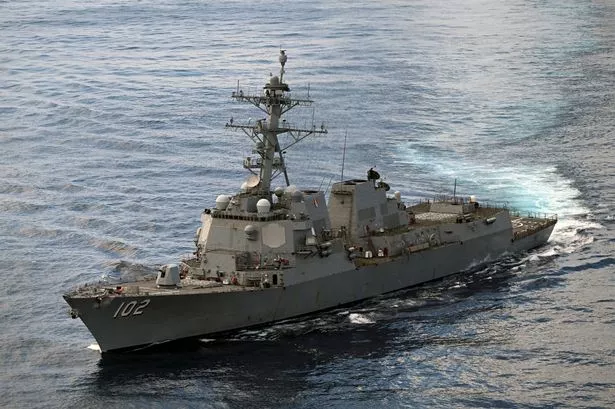World
Expert Warns Against Military Focus on Venezuela Amid Greater Threats

A former U.S. official has argued that the focus on military action against drug trafficking from Venezuela is misplaced, suggesting that the Trump administration should prioritize more pressing global threats. Frank Rose, who served as the Assistant Secretary of State for Arms Control, Verification, and Compliance under President Barack Obama, stated that the deployment of Navy assets to the Caribbean is counterproductive.
Recently, President Donald Trump ordered the positioning of Navy resources in the Caribbean to combat drug trafficking from Venezuela and other Latin American countries. Rose, however, contends that these military assets would be better utilized in the Indo-Pacific region and around Europe to address challenges posed by China, North Korea, Russia, and Iran.
“We are witnessing a revolution in warfare,” Rose noted, referencing the evolving nature of military conflict, including the use of drone swarms in Ukraine and precision strikes in the Middle East. He emphasized that the U.S. must remain focused on state-level threats rather than engage in operations against drug traffickers.
Rose highlighted China’s rapid military expansion, estimating that its naval capabilities are currently 200% larger than those of the United States. “My priority would be to deploy the U.S. Navy’s available assets to the Indo-Pacific as a deterrent to China,” he stated, pointing out that the U.S. Navy has fewer surface combatants than China.
The Trump administration’s strategy has raised eyebrows among experts, including Rose, who argued that diverting resources to combat drug trafficking does not align with the U.S.’s key national security challenges. “You don’t deter Beijing by chasing cocaine smugglers in the Caribbean,” he asserted.
While acknowledging the seriousness of the drug influx into the U.S., Rose expressed skepticism about the military’s role in addressing this issue. He noted that effective law enforcement and intelligence operations already exist to tackle drug trafficking, and suggested that these should be prioritized over military engagement.
Trump has also contemplated military strikes within Venezuela targeting installations linked to drug trafficking organizations allegedly overseen by Venezuelan leader Nicolás Maduro. Although he has hinted at using Navy assets like the USS Ford—an aircraft carrier capable of carrying over 75 aircraft—the specifics of such military actions remain unclear.
Rose pointed out that the deployment of aircraft carrier battle groups is costly and requires careful strategic planning, particularly given the limited number of deployable aircraft carriers. Currently, the U.S. Navy has 11 aircraft carriers in service, with only about half typically available for actual deployment. Approximately 14% of the Navy’s total assets are currently allocated to the Caribbean, a distribution Rose believes should instead prioritize countering state-level threats in the Indo-Pacific and Europe.
“Let’s keep our war fighters focused on the threats that only they can deter,” he concluded, advocating for a clear distinction between military and law enforcement roles in addressing national security issues. Overall, Rose’s insights reflect a growing concern among experts regarding the U.S. military’s current strategic focus amid evolving global threats.
-

 Sports2 weeks ago
Sports2 weeks agoSteve Kerr Supports Jonathan Kuminga After Ejection in Preseason Game
-

 Top Stories6 days ago
Top Stories6 days agoMarc Buoniconti’s Legacy: 40 Years Later, Lives Transformed
-

 Politics2 weeks ago
Politics2 weeks agoDallin H. Oaks Assumes Leadership of Latter-day Saints Church
-

 Business2 weeks ago
Business2 weeks agoTyler Technologies Set to Reveal Q3 2025 Earnings on October 22
-

 Science2 weeks ago
Science2 weeks agoChicago’s Viral ‘Rat Hole’ Likely Created by Squirrel, Study Reveals
-

 Lifestyle2 weeks ago
Lifestyle2 weeks agoKelsea Ballerini Launches ‘Burn the Baggage’ Candle with Ranger Station
-

 Lifestyle2 weeks ago
Lifestyle2 weeks agoDua Lipa Celebrates Passing GCSE Spanish During World Tour
-

 Entertainment2 weeks ago
Entertainment2 weeks agoZoe Saldana Advocates for James Cameron’s Avatar Documentary
-

 Health2 weeks ago
Health2 weeks agoRichard Feldman Urges Ban on Menthol in Cigarettes and Vapes
-

 Health2 weeks ago
Health2 weeks agoCommunity Unites for Seventh Annual Mental Health Awareness Walk
-

 World2 weeks ago
World2 weeks agoD’Angelo, Iconic R&B Singer, Dies at 51 After Cancer Battle
-

 Business2 weeks ago
Business2 weeks agoMLB Qualifying Offer Jumps to $22.02 Million for 2024









